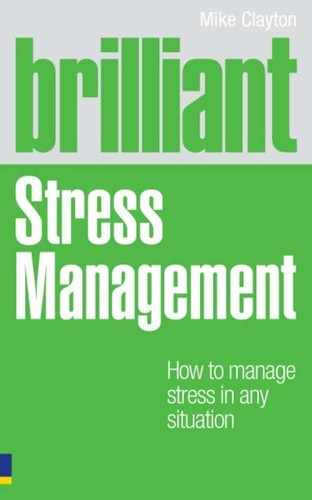
196 brilliant stress management
what resources they have, and how things can turn out positively.
This has a close relative . . .
The end is nigh
When we are stressed and unable to think clearly, the smallest
things appear to have the greatest consequence. ‘If I don’t get this
done, she’ll . . . hate me, sack me, leave me.’ Help explore the likely real
consequences, so that things can be assigned a realistic priority,
and some things can be neglected safely and without remorse.
A related form of faulty thinking – and the opposite of assigning
cause – is fortune-telling, seeing a future based on little or no
evidence and a lot of faulty beliefs and false inferences. Once
again, uncovering the source of these predictions can lead to
better assessments of what the real evidence indicates.
My fault
The last of our examples of faulty thinking is to accept blame
and feel excessive remorse for things – even when there is no
blame at all. Tread carefully here,
because stressed people do make
mistakes. What is important is not
the fault, but the remedy. ‘It may be
your fault, it may not. If it is, you must
apologise. Either way, let’s think through what needs to be done and
what is the rst thing you can do to start to put it right.’
Blame and reason
‘My fault’ is one start of the blame game, which turns the blame
in on ourself. Another start is to turn the blame on someone else.
Now, when we are stressed, we can start to build a whole fantasy
on this faulty belief. The psychological eld of Transactional
Analysis (or TA) has a powerful model that can help you under-
stand what is going on. It is called The Drama Triangle and was
developed by Stephen Karpman.
what is important is
not the fault, but the
remedy

Help others to manage their stress 197
The drama triangle
In this triangle, there are three roles: the victim, the persecutor
and the rescuer. You are likely to observe two sides of the triangle
in place: the person you are helping as the victim and the person
they blame as the persecutor. The most important thing to know
is this: the drama triangle represents faulty thinking. Victim, per-
secutor and rescuer roles are perceptions only.
Therefore, you are not there to become their rescuer. If you do,
you become part of the drama and risk making the situation
worse for them and for you. Let me give you an example of how
easily this can happen.
Virgil: It’s so awful; Patsy has given me so much work. I can’t
cope. I am never going to be able to get home tonight. My
weekend will be ruined.
(5 I am the poor victim here and Patsy is my
persecutor.)
Rene: I am sure Patsy did not mean to ruin your weekend. Let’s
talk it through.
© MikeClayton,2011
Persecutor Rescuer
Victim
P
R
V
Figure 10.1 The drama triangle
198 brilliant stress management
(5 Patsy is not persecuting you; don’t be a victim.)
Virgil: She may not have meant it, but she’s so thoughtless. Thank
you for offering to help. I am sure with both of us working
on it it’ll get done more quickly.
(5 Patsy is persecuting me, but now you have come to
rescue me.)
Rene: I’m sorry, I am not able to stay late with you, but I would
be willing to help you plan your work, to get it done more
efciently.
(5 I am not your rescuer.)
Virgil: I see. You’re just like Patsy. Now you want to make me stay
late and do Patsy’s work. Some friend!
(5 No, you are not my rescuer, you’re here to
persecute me.)
Rene: Now hold on. Don’t cast me as the bad cop. I only offered to
help.
(5 Oh thanks. Now you’re persecuting me. I feel like
the victim here.)
It would be easy to go on, but you get the drift. These switches
around the triangle give us a psychological pay-off, as we shed
blame from ourselves and hand it to someone else. We feel good
when we rescue and, strangely, feel less responsible when we are
victim. When we consciously persecute, we feel in control.
Break the triangle – refuse to get involved in the drama. This is
difcult and requires that you can sense a trap and not fall into
it. But even then, we saw Rene spot the rescuer trap and still end
up feeling persecuted. There are seven ways that can help you
avoid stepping on to the drama triangle.
1 Stick to asking questions to uncover facts. With facts, the
drama starts to weaken.
2 Invite the other player to take responsibility for themselves.
..................Content has been hidden....................
You can't read the all page of ebook, please click here login for view all page.
